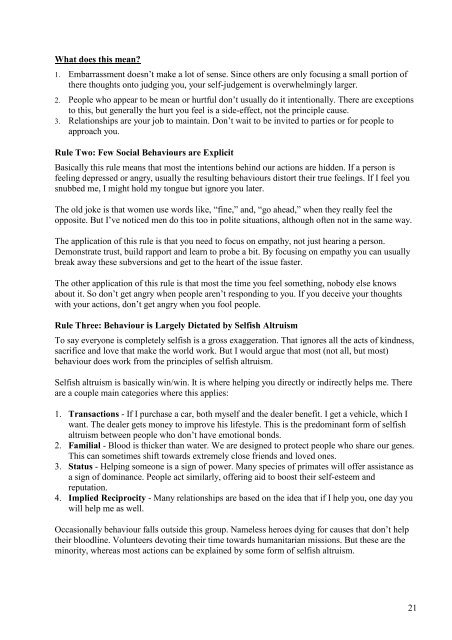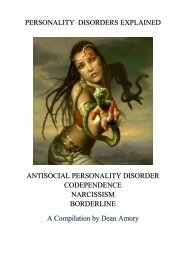How To Enhance Your Life - Dean Amory
Techniques for enhancing the quality of your life
Techniques for enhancing the quality of your life
Create successful ePaper yourself
Turn your PDF publications into a flip-book with our unique Google optimized e-Paper software.
What does this mean?<br />
1. Embarrassment doesn’t make a lot of sense. Since others are only focusing a small portion of<br />
there thoughts onto judging you, your self-judgement is overwhelmingly larger.<br />
2. People who appear to be mean or hurtful don’t usually do it intentionally. There are exceptions<br />
to this, but generally the hurt you feel is a side-effect, not the principle cause.<br />
3. Relationships are your job to maintain. Don’t wait to be invited to parties or for people to<br />
approach you.<br />
Rule Two: Few Social Behaviours are Explicit<br />
Basically this rule means that most the intentions behind our actions are hidden. If a person is<br />
feeling depressed or angry, usually the resulting behaviours distort their true feelings. If I feel you<br />
snubbed me, I might hold my tongue but ignore you later.<br />
The old joke is that women use words like, “fine,” and, “go ahead,” when they really feel the<br />
opposite. But I’ve noticed men do this too in polite situations, although often not in the same way.<br />
The application of this rule is that you need to focus on empathy, not just hearing a person.<br />
Demonstrate trust, build rapport and learn to probe a bit. By focusing on empathy you can usually<br />
break away these subversions and get to the heart of the issue faster.<br />
The other application of this rule is that most the time you feel something, nobody else knows<br />
about it. So don’t get angry when people aren’t responding to you. If you deceive your thoughts<br />
with your actions, don’t get angry when you fool people.<br />
Rule Three: Behaviour is Largely Dictated by Selfish Altruism<br />
<strong>To</strong> say everyone is completely selfish is a gross exaggeration. That ignores all the acts of kindness,<br />
sacrifice and love that make the world work. But I would argue that most (not all, but most)<br />
behaviour does work from the principles of selfish altruism.<br />
Selfish altruism is basically win/win. It is where helping you directly or indirectly helps me. There<br />
are a couple main categories where this applies:<br />
1. Transactions - If I purchase a car, both myself and the dealer benefit. I get a vehicle, which I<br />
want. The dealer gets money to improve his lifestyle. This is the predominant form of selfish<br />
altruism between people who don’t have emotional bonds.<br />
2. Familial - Blood is thicker than water. We are designed to protect people who share our genes.<br />
This can sometimes shift towards extremely close friends and loved ones.<br />
3. Status - Helping someone is a sign of power. Many species of primates will offer assistance as<br />
a sign of dominance. People act similarly, offering aid to boost their self-esteem and<br />
reputation.<br />
4. Implied Reciprocity - Many relationships are based on the idea that if I help you, one day you<br />
will help me as well.<br />
Occasionally behaviour falls outside this group. Nameless heroes dying for causes that don’t help<br />
their bloodline. Volunteers devoting their time towards humanitarian missions. But these are the<br />
minority, whereas most actions can be explained by some form of selfish altruism.<br />
21


















